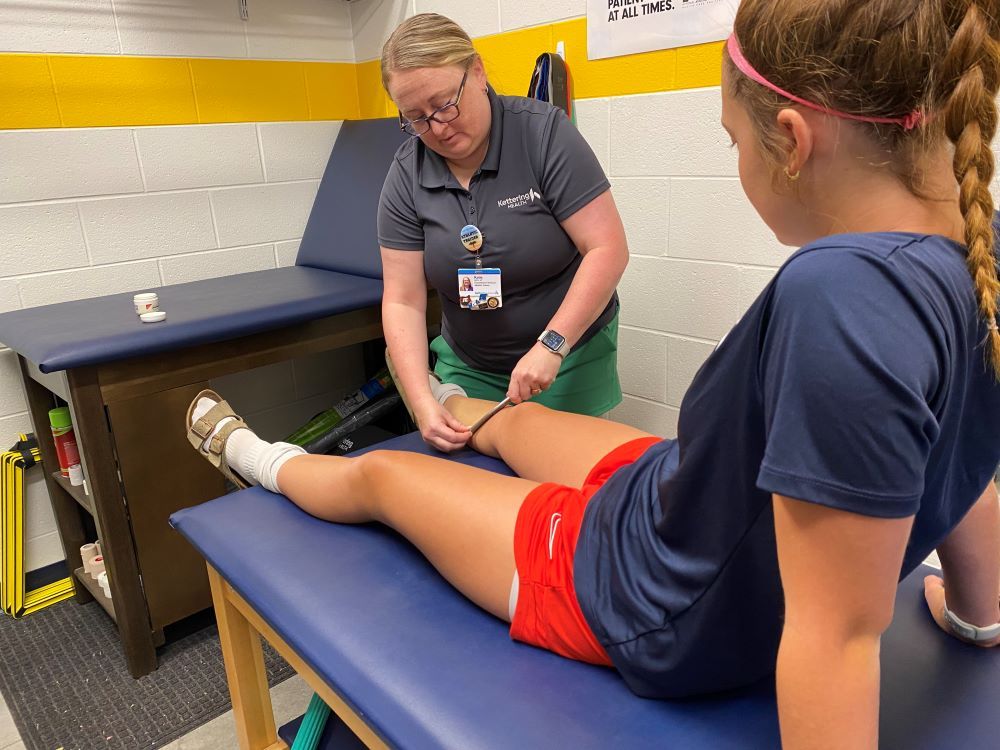Sports Medicine
Want to learn more about this at Kettering Health?
Playing a beloved sport, especially on a team, can define a person’s adolescent and teenage years. The rigors of physical activity, dynamics of teamwork, and journey of winning and losing shape a student-athlete.
“As an athletic trainer, I love to see kids play sports,” says Katie LaRue-Martin, athletic trainer (AT). “It’s so great for them developmentally. But many kids today see their favorite athletes on TV and social media and assume they perform at that level year-round. So they try to do the same—and it creates problems.”
With the prevalence of club teams, along with school-sports schedules, student-athletes have the opportunity to compete in the same sport year-round. It’s called sports specialization, and it can begin as early as grade school.
The trouble with playing one sport year-round, as Katie attests to, is that “students get burned out and injured if they don’t take proper precautions.”
The usual suspects
What Katie has seen as an AT has been witnessed for years throughout the United States. Groups such as the American Academy of Pediatrics have published findings about how “sports specialization has led to an increase in overuse injuries, overtraining, and burnout.” Other studies have shown that specializing in a sport puts students-athletes at a “50 percent greater risk” of injury.
“Student-athletes’ bodies are still developing,” says Katie. “Doing the same motions year-round puts wear and tear on muscles and bones that aren’t prepared for that.”
While every sport has its own risks, the sports where specialization—and overuse injuries—are most common are
- Running sports, like cross country and track
- Soccer
- Volleyball
- Tennis
Student-athletes specializing in one sport don’t get the time they need to rest between seasons. The result is overuse injuries that can escalate into severe injuries, “such as a stress fracture that becomes a full-blown fracture or a tendinopathy that becomes a complete tear,” says Katie.
And that means more additional healthcare costs for treatment—and more time away from competition during recovery.
The most common overuse injuries Katie sees from sports specialization are
- Tendinopathy (tiny tears in a tendon from repeated strain)
- Stress fractures
- Knee and joint pain
Katie also points to less obvious but just-as-severe issues like burnout. “There’s an important psychological component to sports,” she says, “and the constant pressure to compete or the disappointment of injury can be a lot on a student.”
Variety is the spice of sports
The solution, Katie encourages, isn’t an off-season on the couch. Instead, she recommends letting younger athletes “sample sports,” trying different ones as seasons cycle, along with cross-training, and, yes, a little rest. She also points to recommendations, endorsed by many athletic training groups, including
- Delaying sports specialization as long as possible
- Participating on one team at one time
- Practicing or training the same number of hours per week as a student’s age (i.e., ten hours a week for a ten-year old athlete)
- Playing a single sport fewer than eight months per year
- Resting for two days a week
- Resting from organized sports
Katie emphasizes that resting “could include playing pick-up games during off-seasons.”
Responding to an injury
The allure of specializing in a sport is the competitive edge. But nothing can dull that edge like overuse injuries, which can largely be avoided. If you or a student-athlete suspects an injury, don’t overlook it. Take them to their athletic trainer. How you relate to their advice can make all the difference.
As Katie points out, “If the AT recommends backing off or cross-training, that advice won’t ruin your kid’s career. It’ll enhance it. Have a positive reaction to help your student-athlete have a positive reaction. Remember that we’re going to help them stay active and in-shape.”









